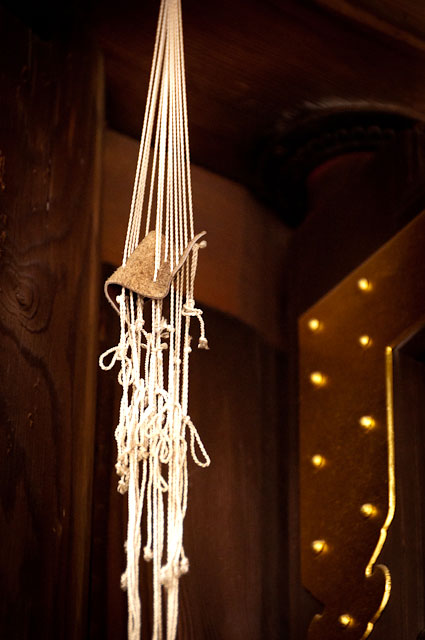Contributed by David Surtasky
Spirits that visit us in our dreams. Furtive and unbidden.
The story is told through noh over and over. The traveler, a priest, a monk, a courtier, a messenger – comes to a particular place, and through some connection there is visited by a spirit who cannot find release from our world: pray for me, is often their refrain, help me please to escape the endless torment.
 Upon occasion they do find release. Sometimes they don’t.
Upon occasion they do find release. Sometimes they don’t.
Are these just ghost stories, or do they touch on some aspect of our nature that needs to bring forth the spirits that reside in our dreams? We don’t understand the process of dreams in much greater detail than we might have during Zeami’s lifetime. It may be that we have an inherent need to call forth and confront our passions and fears and make them manifest in a way that allows us to address them.
There are personal dangers inherent in the spectrum of emotions typified by noh’s displaced spirits: attachment, obsession, jealousy and revenge. The stories warn that the inability to be released from these feelings will bind us to the wheel of karma, to turn over and over in the material world.
The valiant female warrior Tomoe’s spirit returns to the site of her master’s death, full of remorse that she could not stay and die with him. At the end of her story she begs the attendant monks for release from her obsessions. In the play Motomezuka, the pitiable girl Unai returns and describes in detail her torture in the afterworld – even prayer seems unable to quench the perceived guilt she feels over the death of her would-be suitors. Tomomori returned from his watery grave to wreak revenge on Yoshitsune, finally driven off but not dispelled. Atsumori brought to release by the fervent prayers of his erstwhile enemy Kumagae. The list goes on.
 Perhaps underneath the conclusion that certain works in noh’s canon function as Buddhist morality tales, there lies a more fundamental human impulse related to our collective struggles with emotions. It is likely that what Zeami thought of as guilt may not necessarily be the feeling that we share in contemporary society, or that noh’s caution against jealousy is embedded within the framework of a polygamist society. There is no way to understand if the emotions being described in translation from ancient times are the same ones we might feel today.
Perhaps underneath the conclusion that certain works in noh’s canon function as Buddhist morality tales, there lies a more fundamental human impulse related to our collective struggles with emotions. It is likely that what Zeami thought of as guilt may not necessarily be the feeling that we share in contemporary society, or that noh’s caution against jealousy is embedded within the framework of a polygamist society. There is no way to understand if the emotions being described in translation from ancient times are the same ones we might feel today.
That we might feel, perchance as they did. That we might speak the proper names while torches burn under a waxing moon, and in so doing summon the long dead back to our perception. That we might dream or pray and evoke aspects of our truest natures. Upon occasion the spirits do find release. Sometimes they don’t.
The Jetavan Temple bells ring the passing of all things.
Twinned sal trees, white in full flower,
declare the great man’s certain fall.
The arrogant do not long endure:
They are like a dream one night in spring.
The bold and brave perish in the end:
They are as dust before the wind.
(Tyler, Royall. The Tale of the Heike. New York: Viking, 2012. Print.)





Dear Noh people 能人,
I’ve just translated this post into Vietnamese and posted it here http://quihien.blogspot.com/2013/07/am.html with proper credits. I am now asking for your permission. As your blog mission goes “We invite and encourage you to read through the variety of topics offered here, and to share this information with your friends and colleagues”, I think what I’ve done is not the wrong thing.
Thank you in advance for all the goodness and great information about Noh so far. If permitted, I would like to translate some more from this blog so that more people can get brought close to Noh.
Dear Hien,
Thank you very much for your consideration. We’re very happy to know that you’ve taken the time to post from our blog in Vietnamese. If you are interested in translating more of our entries, we encourage you to do so. Our desire is for many people to have the opportunity to experience and think about noh. It sounds like we have similar interests and goals.
We’d also be happy to see any additional translations that you make. Thank you again.